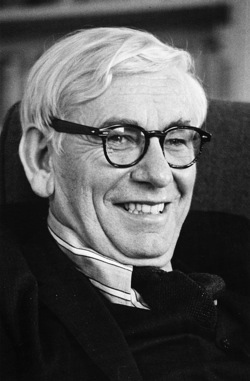H. Edwin Young, former chancellor, dies at 94
Hugh Edwin Young, who served as chancellor of the University of Wisconsin–Madison during the tumultuous Vietnam War era, died on Monday, Jan. 2 in Madison. He was 94.

Young
(Photo courtesy of UW–Madison Archives)
“For over 40 years, Edwin Young brought shrewd and wise leadership to every position he held on campus, offering stability during some of the university’s most trying times,” says Interim Chancellor David Ward. “We send our thoughts and best wishes to his family.”
Young’s folksy Maine accent and dry humor masked a canny political mind. With a background in labor relations and an intricate network of contacts, he surveyed each challenge carefully before deciding how to move.
“Ed once said his definition of leadership was finding out which way the crowd was going, then running fast to get out front,”says Art Hove, who served as special assistant to the chancellor beginning in 1970. “He could always disarm people with some kind of remark, to make them laugh or understand what was really going on.”
Born on May 3, 1917 in Bonne Bay, Newfoundland, Canada, Young received his bachelor of arts degree from the University of Maine in 1940. He came to Madison to pursue graduate degrees in economics, receiving his MA in 1942 and his Ph.D. in 1950. In 1947, during his doctoral work, he began teaching; he became a full professor in 1955.
After a stint in Europe as industrial relations consultant for the State Department, Young worked his way up the university’s administrative ranks. Beginning as director of the School for Workers, he then served as chair of the economics department from 1953 until 1961, when he became dean of the College of Letters and Science. In 1965, he took his first presidential job, returning to his alma mater as head of the University of Maine.
The protests of the late 1960s led to many administrative changes, and Young soon found himself in the center of the action. Returning to Wisconsin in July 1968, he served as vice president of the university and professor of economics. But in a special meeting on Sept.13, 1968, the Regents appointed Young chancellor, effective immediately. He was the university’s fourth chancellor in 18 months.
As chancellor, Young took a harder stance on radical activity than some of his predecessors. The approach earned him the title “War Maker, Strike Breaker” and an unflattering portrayal in the documentary “The War at Home.” Still, his efforts gained praise from administrators across the country.
“To throw rocks from the middle of a mob is not heroic… Making a lot of concessions was like giving red meat to the lions,” Young recalled in 1987. “They wanted to close the university down — the one place where they were free to speak and protest — which seemed kind of anti-intellectual to me.”
In his most controversial decision, Young called in the Wisconsin National Guard, gaining national notoriety. Young maintained that he did so to protect the students from untrained sheriff’s deputies who may have wanted to “teach these young people a lesson.”
“The abiding thing about Ed, and what he did for the university, was that he kept it open during a very dynamic and dramatic time,” says Hove. “Many were calling for him to shut it down, but he was steadfast in upholding the mission of the university and the way it functioned. He did an awful lot of good by making sure that the university wouldn’t do things that would compromise its values.”
The Sterling Hall bombing in 1970 marked a turning point on campus. Young’s next challenge came with the merger of the University of Wisconsin and the Wisconsin State Universities, finalized in October 1971.
Even as president of the UW System, a position he held from 1977 to 1980, Young remained somewhat neutral about the merger. Though he appreciated the consolidation of budget responsibilities, he worked to ensure that individual campuses retained as much autonomy as possible.
UW System President Kevin Reilly issued a statement Monday praising Young’s work with the system.
“As the University of Wisconsin System’s second president, Dr. Young helped shape Wisconsin’s public university at a pivotal moment in our proud history. Having served as the UW–Madison chancellor, he worked diligently to ensure that individual universities and colleges retained maximum operational freedom within a unified statewide system,” Reilly said. “We would do well to keep that goal in mind, as we work today to preserve a world-class UW System that serves 180,000 students and all Wisconsin citizens.”
During the mid-1970s, Young and his colleagues worked on many “little projects and joint efforts,” as described by former assistant Joel Skornicka, later mayor of Madison. The formation of the University Research Park was one mark of improved relations between the university and city.
Other efforts during Young’s time paved the way for stronger involvement around the world. A 1955 partnership between the economics department and Indonesia’s Gadjah Mada University began a longstanding exchange of faculty members and top graduate students. As chancellor, and later as he returned to the faculty, his support for international studies brought delegations from around the world.
Upon his 1987 retirement (as Rennebohm Professor of Applied Economics), Young had no regrets. As his most radical opponents became respected members of society, he considered it part of the beauty of the university.
“You can be as radical as you want here and then get a job and wear a three-piece suit,” he was quoted as saying in an Associated Press article. “I worked on the theory that if you’d keep people out of jail, eventually they’d become advertising executives.”
Young’s spouse, Phyllis, passed away in 1993. Survivors include children Jill (Joaquim) Coelho of Belmont, Mass., John (Pam Loflin) Young of Rockland, Mass., Dorothy Young of Austin, Tex., Nathan (Gael Cheek) Young of Potomac, Md., and Barbara (Paul) Bielec of Madison; six grandchildren and two great grandchildren.
Memorials may be made to the Free Rural Eye Clinic and the Department of Economics, both care of the UW Foundation, and to the University of Maine.
A celebration of his life will take place at a later date.
Tags: obituaries



